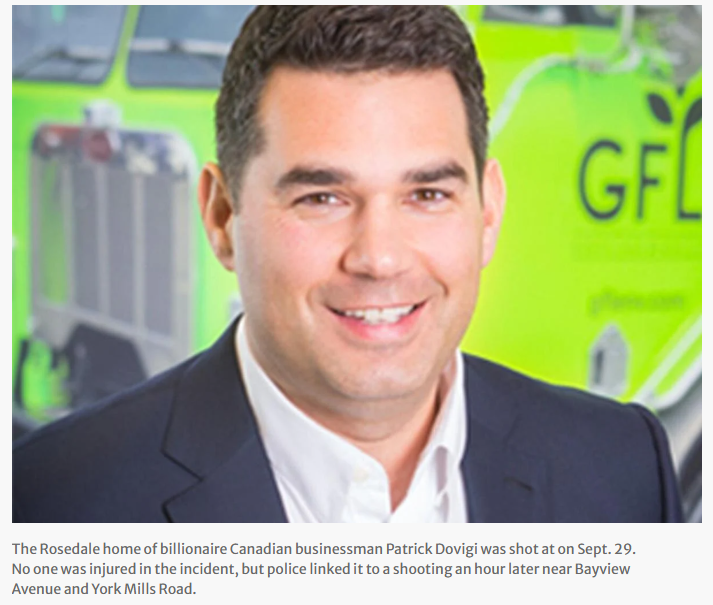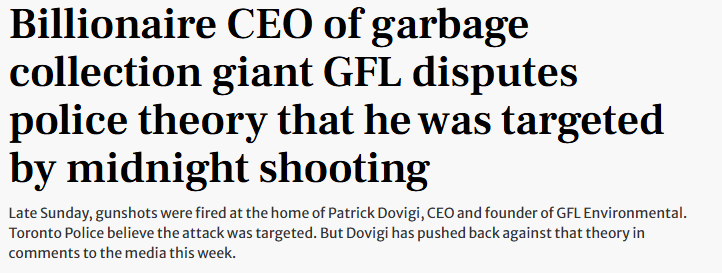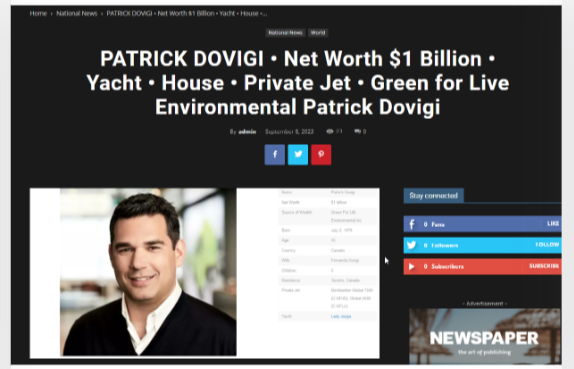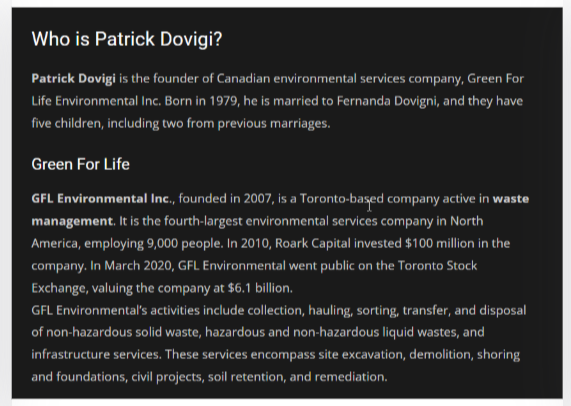Introduction
Patrick Dovigi’s rise from a young hockey hopeful to the billionaire CEO of GFL Environmental Inc. is a tale that has captivated both business analysts and investigative journalists alike. His ascent through the corporate ranks is nothing short of remarkable, yet it casts a long shadow filled with allegations, legal controversies, and whispered connections to dark undercurrents in the waste management industry.
As investigative journalists, we sought to unearth the layers behind Dovigi’s public persona, peeling back the curtain on his business dealings, personal affiliations, and the questions that linger about his empire. From allegations of financial mismanagement to unsettling incidents of violence surrounding his business, there is a complex story at play — one that demands attention.
Through rigorous research into corporate filings, financial reports, legal proceedings, and media investigations, we’ve uncovered a portrait of a man who rose rapidly, accumulated immense wealth, and yet cannot seem to outrun the red flags that continue to surface. This investigation delves deep into Dovigi’s journey, exploring not only his achievements but also the risks posed to those who engage with his business empire.

Building an Empire: The Genesis and Expansion of GFL Environmental
Patrick Dovigi’s business acumen first came to light when he founded Green For Life Environmental (GFL) in 2007. At the time, Canada’s waste management industry was highly fragmented, composed of small operators serving local communities. Recognizing an opportunity, Dovigi embarked on an aggressive growth strategy that saw GFL acquire over 250 smaller waste management and environmental services firms across Canada and the United States.
GFL’s acquisitions weren’t just about scale — they represented a strategic maneuver to eliminate competition, rapidly grow market share, and consolidate a notoriously opaque industry. The company quickly transformed into a multinational juggernaut, operating across ten Canadian provinces and 25 U.S. states, generating nearly $8 billion in annual revenue.
Notably, some of GFL’s acquisitions raised eyebrows. The purchase of Rizzo Environmental Services, a Michigan-based firm embroiled in a high-profile corruption scandal, placed GFL under a microscope. Critics questioned whether proper due diligence had been conducted, or if the acquisition signaled a willingness to do business in murky waters.
The Man Behind the Empire: Patrick Dovigi’s Personal Journey
Patrick Dovigi’s story began far from the boardrooms of billion-dollar corporations. Born and raised in Sault Ste. Marie, Ontario, his early life revolved around the ice rink. Drafted by the Edmonton Oilers in 1997, he briefly played for the Detroit Red Wings before injuries cut his hockey career short. Undeterred, Dovigi turned his attention to business, enrolling at Ryerson University to study commerce.
Those who know Dovigi describe him as intensely private, but his wealth and lifestyle paint a vivid picture. He married model Fernanda Dovigi, and their life is one of opulence — Aspen mansions, Muskoka cottages, Miami penthouses, and even a $59.75 million estate once owned by Jack Nicholson.
Yet for all the glamour, shadows lurk. Incidents of violence, such as the shooting at his Rosedale mansion and multiple arsons at GFL sites, hint at potential conflicts beyond boardroom negotiations. Police have labeled these incidents as targeted attacks, but official motives remain elusive.
Navigating Controversies: Allegations, Legal Scrutiny, and Red Flags
Dovigi’s rise has not been without controversy. In 2020, Spruce Point Capital Management published a damning report accusing GFL of inflating its financial health and maintaining undisclosed relationships with figures accused of financial misconduct. The report suggested that GFL’s acquisition spree masked structural weaknesses and potential financial improprieties.
Furthermore, questions arose regarding GFL’s debt structure, with claims that the company understated its liabilities while overstating its cash flow. The report also alleged that Dovigi maintained associations with individuals tied to organized crime, though no concrete evidence ever emerged.
Violence has also marred GFL’s reputation. Shootings at Dovigi’s personal residences and arsons at GFL facilities have led to speculation about rivalries or organized crime involvement. Police investigations remain ongoing, with few public disclosures, leaving a cloud of uncertainty over these events.

Assessing Risks: Anti-Money Laundering and Reputational Concerns
The waste management industry has long been considered a high-risk sector for money laundering. Large cash transactions, complex corporate structures, and the sheer scale of operations create fertile ground for illicit financial activities.
In GFL’s case, its rapid acquisition of over 250 companies, some of which had questionable backgrounds, raises legitimate concerns. Acquiring firms like Rizzo Environmental Services — previously embroiled in corruption scandals — introduced potential AML risks that required heightened scrutiny.
Moreover, the allegations leveled against GFL’s accounting practices only amplify concerns regarding transparency and accountability. As the company expanded, the complexity of its financial structure increased, making it harder for regulators to track the flow of funds and identify suspicious activities.
For investors and business partners, these red flags are impossible to ignore. AML vulnerabilities not only pose a legal threat but also heighten reputational risks that could impact GFL’s ability to secure contracts and financing.
The Business Playbook: Aggressive Growth and Questionable Deals
Dovigi’s business model was simple yet effective — acquire, expand, and dominate. GFL Environmental Inc. was founded in 2007 with the goal of consolidating Canada’s fragmented waste management industry. From humble beginnings with just four trucks and a single transfer station, GFL rapidly grew through a series of acquisitions that spanned Canada and the United States.
However, the speed and scale of these acquisitions raised eyebrows. The purchase of Rizzo Environmental Services in 2016 became a flashpoint. Rizzo was embroiled in a Michigan corruption scandal involving bribery and fraud at the time of its acquisition. Critics questioned GFL’s due diligence and whether the company turned a blind eye to potential criminal activity.
Additionally, GFL’s expansion strategy left it heavily leveraged. Reports indicated that the company’s debt-to-earnings ratio far exceeded industry norms. Short-seller Spruce Point Capital alleged that GFL inflated its cash flow and understated its debt, raising concerns about the company’s financial health. While GFL denied the accusations, the lack of transparency continued to fuel suspicions.
Behind the Billionaire: Patrick Dovigi’s Personal Life and Network
Patrick Dovigi’s personal life is as enigmatic as his business dealings. Born in Sault Ste. Marie, Ontario, his first passion was hockey. Drafted by the Edmonton Oilers in 1997, his athletic career was cut short by injuries, prompting a shift to business. After studying commerce at Ryerson University, Dovigi’s entrepreneurial instincts took over, and he built his empire.
Dovigi is notoriously private, but glimpses into his lifestyle reveal a life of immense wealth and luxury. He is married to model Fernanda Dovigi, and their real estate holdings include multi-million-dollar properties in Aspen, Miami, and Toronto. In 2022, he made headlines for purchasing a $59.75 million estate in Beverly Hills, once owned by Jack Nicholson.
His network extends beyond the boardroom. Early investors in GFL included BC Partners and Canaccord Genuity’s David Kassie — names with deep roots in Canadian finance and private equity. There are whispers of undisclosed ties to figures from his hockey days, but evidence remains scarce.

Under the Microscope: Allegations and Legal Battles
As GFL grew, so did the controversies surrounding Dovigi. Spruce Point Capital’s 2020 report painted a damning picture, alleging that GFL engaged in creative accounting practices to mask its debt and inflate its earnings. The report also hinted at undisclosed relationships between Dovigi and figures with checkered pasts in the waste management industry.
Adding to the intrigue, violence began to follow GFL’s rise. In 2022, a shooting occurred at Dovigi’s Rosedale mansion in Toronto. Police labeled the incident a targeted attack, sparking rumors of underworld connections. Around the same time, arsons struck GFL facilities in Vaughan and Windsor. While no direct links to Dovigi were established, the events fueled speculation about industry rivalries and darker forces at play.
Criminal proceedings, lawsuits, and sanctions have so far avoided Dovigi himself, but the cloud of suspicion grows with each new incident.

The Money Trail: AML Risks and Financial Red Flags
GFL’s meteoric rise relied heavily on acquisitions, creating a sprawling corporate structure that makes financial transparency challenging. The company’s rapid growth raised red flags for anti-money laundering (AML) experts, who noted that waste management has historically been a high-risk industry for money laundering due to its cash-intensive nature and complex supply chains.
Some analysts speculated that GFL’s acquisitions may have provided opportunities to obscure financial flows. In particular, the Rizzo acquisition drew attention for potentially bringing tainted assets into the fold. Additionally, GFL’s Luxembourg headquarters added another layer of opacity, as the country’s banking laws historically made it a haven for hidden wealth.
Public Perception: A Divided Narrative
Patrick Dovigi’s public image is deeply polarizing. To some, he is a visionary entrepreneur who built a billion-dollar empire through hard work and tenacity. To others, he is a figure of suspicion whose success is shadowed by unanswered questions and violent incidents.
On social media, opinions are equally split. Supporters hail his “rags-to-riches” journey and his ability to outmaneuver larger competitors. Critics, however, point to the allegations of financial mismanagement and the unexplained acts of violence as proof that GFL’s rise may not be as clean as it seems.
Media outlets have painted contrasting portraits. Forbes lauds his business acumen, while investigative pieces from The Globe and Mail and The Toronto Star hint at a darker narrative. As the controversies grow, so does the scrutiny of Dovigi’s past and present dealings.

Conclusion
Patrick Dovigi’s ascent from hockey rinks to boardrooms is undoubtedly impressive. As the founder and CEO of GFL Environmental Inc., he built a multibillion-dollar empire through aggressive expansion and keen business acumen. Yet his journey has been marred by controversy, allegations, and unsettling incidents of violence that cannot be ignored.
While no direct evidence ties Dovigi or GFL to criminal activities, the sheer volume of allegations raises legitimate concerns. The acquisition of scandal-tainted companies, accusations of financial mismanagement, and ongoing police investigations into violent incidents create a complex risk profile.
From an anti-money laundering perspective, GFL’s rapid growth, lack of financial transparency, and proximity to individuals with questionable backgrounds make it a high-risk entity. For investors and regulators alike, the message is clear: proceed with caution.
Patrick Dovigi stands at a crossroads — his legacy could either be that of a visionary entrepreneur or a cautionary tale of ambition overshadowed by unanswered questions. As his empire grows, so too does the need for transparency, accountability, and due diligence. Whether Dovigi can rise above the allegations and cement his place as a legitimate business titan remains to be seen.







